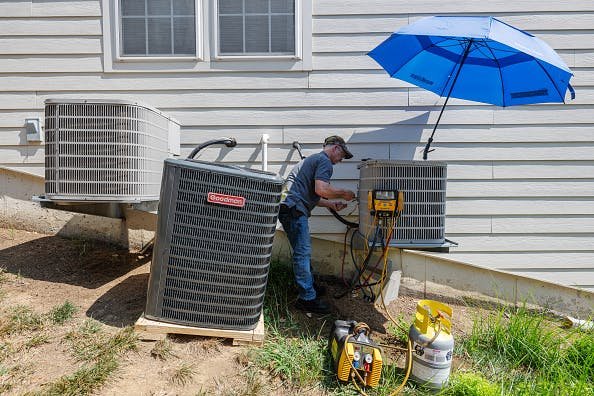An interesting trend, which I’ve highlighted a couple of times now, is that while private equity’s new investments and exits have declined by 60% and 66%, respectively, since 2021, fundraising remains near its peak 2021 levels, creating a tricky situation where funds are raising more money from investors than they are distributing.
Source: Bain Capital
One consequence of this prolonged period of high fundraising activity is that private equity is now involved in more mergers and acquisitions than at any point in history, with Bloomberg reporting that at least 40% of deals reported to the federal government for antitrust review (the threshold for review is deals valued at at least $119.5 million) involve private equity investors. That’s up from 10% in 2001.
As private equity has grown more prominent, one particular area that has seen an uptick in PE involvement has been trade businesses like HVAC and plumbing companies, with business school-educated PE investors scouring small-town USA for home-service businesses, creating Main Street millionaires along the way. From The Wall Street Journal:
PE firms across the country have been scooping up home services like HVAC—that is, heating, ventilation and air conditioning—as well as plumbing and electrical companies. They hope to profit by running larger, more profitable operations.
Their growth marks a major shift, taking home-services firms away from family operators by offering mom-and-pop shops seven-figure and eight-figure paydays. It is a contrast from previous generations, when more owners handed companies down to their children or employees.
The wave of investment is minting a new class of millionaires across the country, one that small-business owners say is helping add more shine to working with a tool belt.
The optics of this are really interesting. Private equity is a high-status, white collar industry full of former investment bankers and business school graduates. HVAC businesses in Tucson, Arizona, are about as blue collar as they come. A decade ago, as noted by an investor in the Journal piece, these small business owners had no one to sell to. Now, thanks to the hundreds of billions of dollars raised by PE funds in recent years, there is a ton of cash — supplied by endowments, family offices, and mega-wealthy limited partners of various funds — destined for the checking accounts of electricians, plumbers, and air conditioning installment specialists, allowing these small business owners to focus on what really matters:
“I want to hunt, fish, drink beer and cook meat,” Rice (a sewage inspector and repairman who sold his business to a PE shop in 2022) says, adding that selling his company has given him greater peace of mind for his family.
It’s funny, really: investors who spent years on Wall Street and got their MBAs from Wharton and Harvard are now doing due diligence on small businesses around the country, competing with other investors to write multimillion-dollar checks that will subsidize plumbers’ ability to “hunt, fish, drink beer, and cook meat.”
At the end of the day, every market is determined by supply and demand. It seems like, if 40% of large transactions now involve private equity buyers, and profitable small trade businesses are warranting multimillion-dollar acquisition offers, the high-probability path to getting rich is not going to business school to work for a PE shop that buys small businesses, but going to trade school, and then starting a small business that you can sell to the PE shops where business school guys work after graduation.


